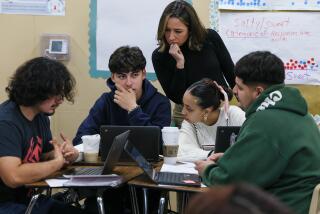The Science Project That Was Put on Ice
- Share via
Teachers at a Carlsbad Catholic school and a drunk-driving watchdog group may have heaped praise on eighth-grader Andy Rock’s science experiment, but officials of the Greater San Diego Science and Engineering Fair decided to disqualify it.
The 13-year-old student at St. Patrick’s Catholic School had hoped to show the effect of alcohol on the reaction time of adults, using a medium to which teen-agers can relate: a Nintendo video game. The project measured the response times of 30 adults, ages 35 to 40, who played the simulated-driving game. Each subject played four times, sober, and their performance was recorded.
The subjects, all friends of the La Costa teen-ager’s family, were then given a drink of alcohol every 15 minutes, playing a game between each of the four drinks. The results showed that, after the second drink, the subjects’ scores decreased substantially.
“The kids thought it was pretty funny that the adults were doing so bad on a car game,” Andy said, adding that most kids who play the game consider it “pretty easy.”
“Nintendo being so popular with the kids right now, I think the experiment had more meaning to the kids and to him,” eighth-grade science teacher Peggy Coughlin said.
After winning first place at the school’s science fair, Andy’s project was disqualified at the Diocesan Science Fair in February by the Greater San Diego Management Committee, a screening committee of the San Diego Science and Engineering Fair, which was held in April.
“Our policy on research with human subjects does not allow any kind of research that would bring any known psychological or physical risk to any of those involved in the experiment,” said Phil Gay, a science and math administrator for the San Diego Unified School District and the director of the science fair screening committee.
This week, however, Andy was honored by the group Mothers Against Drunk Driving for his research and focus on the growing problem of alcohol abuse among teen-agers, said Cindy Roark, president of the San Diego chapter of MADD.
“We felt that he was right on, and he’s going to be our future advocate. It’s more education for young people,” Roark said.
Gay said the committee concluded that the use of alcohol in the experiment endangered both Andy and his subjects, even though they were adults. He cited research showing that alcohol creates long-term psychological and physical effects, particularly the destruction of brain cells.
Gay noted that there had been no medical supervision of the experiment and that the amount of alcohol “seemed to be beyond any reasonable likely level of consumption.”
“It could send a message to students that we might be condoning this type of (dangerous) research, and that we weren’t abiding by the rules that we stated ourselves,” Gay said.
Sally Todd, who is in charge of the Diocesan Science Fair, said that, if Andy had conducted the experiment with “some type of medical supervisor that understood laboratory situations, clinical procedures in this particular area” of study, his experiment might have been allowed to be part of the fair.
But Heidi Rock, Andy’s mother, said a sober adult was present throughout the experiment and no more than four adults were tested at any one time. She noted that, even though previous research has shown the ill effects of alcohol, it is a basic tenet of science that every conclusion must be rigorously retested.
“If you assume their premise, then you have to say it’s ridiculous to retest any scientific theory because it’s been tested already, and you don’t have to retest it,” Rock said.
When Andy’s experiment was disqualified, she said, the screening committee told her that “it was entirely inappropriate for a 13-year-old to be exposed to adults drinking alcohol.”
“I don’t think that (the committee) is willing to face the fact that our children are living in a world so different than they’re used to, they haven’t caught up with the world,” Rock said.
“I guess they are frightened of what alcohol does to people and that children shouldn’t be in that kind of environment,” Andy said. “Most kids know that drinking will affect them, and I just hope that (this experiment) is a reminder to them and that they will think first.”
“What I would hope is that the Greater San Diego Science Fair would take a look at their guidelines, because I think they’re outdated,” Andy’s mother said. “If they really seriously think that a 13-year-old cannot be exposed to adults drinking in a controlled environment, they’ve got to update their rules.”
More to Read
Sign up for Essential California
The most important California stories and recommendations in your inbox every morning.
You may occasionally receive promotional content from the Los Angeles Times.











